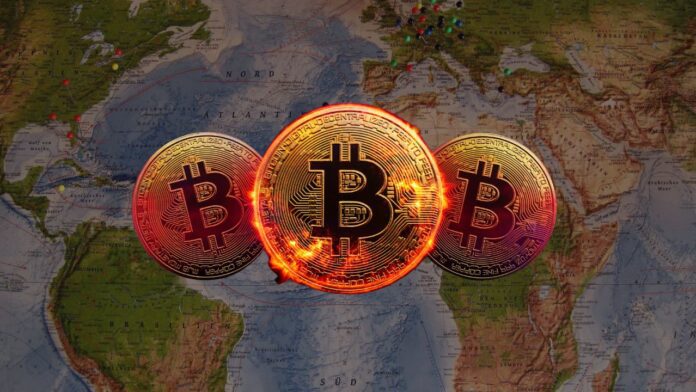Bitcoin has evolved from a decentralized digital currency into a global financial asset. Once regarded as a speculative investment, Bitcoin is now recognized by many governments as a valuable store of value and, in some cases, a strategic reserve.
As its market matures, countries are beginning to hold significant amounts of Bitcoin, either through direct acquisition, seizure, or state-backed investment. In this article, we explore the countries that own the most Bitcoin, why they hold it, and what it means for the future of global finance.
Why Countries Are Investing in Bitcoin

In 2025, more countries are recognizing Bitcoin not just as an investment asset, but as a strategic reserve tool. This shift is driven by several key factors:
- Hedging Against Currency Devaluation: Economies suffering from inflation, such as Argentina and Turkey, are increasingly exploring Bitcoin to stabilize their reserve portfolios. With traditional fiat currencies weakening, Bitcoin offers a deflationary alternative.
- Geopolitical Tensions and Financial Sanctions: Countries facing Western sanctions, including Russia and Iran, have begun integrating cryptocurrencies into cross-border transactions. This allows them to maintain trade flows without reliance on the US dollar-based system.
- De-dollarization Movement: With BRICS expanding and member nations like China and Brazil pushing for alternatives to the U.S. dollar, Bitcoin is being considered as part of a multipolar reserve basket that includes gold and digital currencies.
- Growing Institutional Acceptance: Central banks are closely observing global institutions and ETFs embracing Bitcoin. This has led to ongoing discussions in countries like Switzerland and Singapore about including BTC in sovereign wealth funds.
- Technological Preparedness: Blockchain infrastructure development is on the rise, especially in countries like the UAE and South Korea. These nations view Bitcoin not only as an asset but also as a cornerstone of future financial systems.
Global Economic Shifts and Digital Assets
Inflation, rising debt, and distrust in traditional banking systems have driven many countries to diversify their reserves. Bitcoin, often called “digital gold,” offers a hedge against currency devaluation and economic instability. Nations with unstable economies or facing sanctions find Bitcoin especially appealing due to its decentralized nature.
Crypto-Forward Government Strategies
Countries like El Salvador have taken bold steps by adopting Bitcoin as legal tender. Others, such as the UAE and Singapore, have established crypto-friendly regulations to attract blockchain investment. These strategies are not only economic but also technological, preparing nations for a decentralized digital future.
Top 10 Countries That Own the Most Bitcoin
Here’s a snapshot of the countries with the highest known Bitcoin holdings as of 2025.
|
Rank |
Country |
BTC Holdings |
Estimated USD Value |
Source Entity |
|
1 |
United States |
215,000 BTC |
$13.5 Billion |
Government Seizures |
|
2 |
China |
194,000 BTC |
$12.2 Billion |
Police Confiscations |
|
3 |
Germany |
75,000 BTC |
$4.7 Billion |
Gov Wallets |
|
4 |
El Salvador |
5,800 BTC |
$364 Million |
Treasury Purchase |
|
5 |
Ukraine |
46,000 BTC |
$2.9 Billion |
Citizen Donations |
|
6 |
Russia |
12,000 BTC |
$756 Million |
Unknown |
|
7 |
Bulgaria |
213,519 BTC |
$13.3 Billion |
Seized, Unconfirmed |
|
8 |
Finland |
2,000 BTC |
$126 Million |
Customs Seizure |
|
9 |
United Kingdom |
3,000 BTC |
$189 Million |
Law Enforcement |
|
10 |
Canada |
2,300 BTC |
$145 Million |
ETFs & Reserves |
1. United States

The United States government holds the most confirmed Bitcoin globally. These holdings primarily come from the Department of Justice’s seizures during criminal investigations. Notably, Bitcoin was confiscated from the Silk Road case and various darknet marketplaces. While some coins have been auctioned, large quantities are still held in government-controlled wallets.
2. China
Although China banned crypto trading and mining, it holds a massive Bitcoin stash from past law enforcement seizures. The Chinese government acquired these assets through the crackdown on the PlusToken scam and other crypto-related frauds. China has been cautious about disclosing its crypto strategy but remains one of the top holders.
3. Germany
Germany is increasingly transparent about its Bitcoin holdings. The German Federal Criminal Police Office (BKA) stores seized Bitcoin assets and often transfers them to state-controlled wallets. Germany occasionally sells its Bitcoin, but its holdings still rank among the top globally.
Other Leading Nations
- El Salvador: The first country to make Bitcoin legal tender. The government continues to buy Bitcoin on dips and has integrated BTC into its national treasury.
- Ukraine: Much of Ukraine’s Bitcoin came through donations during the 2022-2023 conflict with Russia. Citizens and crypto supporters globally contributed BTC to support Ukraine’s defense and recovery.
- Bulgaria: Reports suggest Bulgaria once held over 200,000 BTC seized from a cybercrime operation. However, the government has never confirmed its current holdings.
- Russia: While Russia is quiet about its crypto reserves, it’s believed to hold a moderate amount, possibly for sanctions evasion and international trade.
- Finland, UK, and Canada: These countries hold Bitcoin through seizures or financial entities like ETFs (Canada) and police operations (UK).
Public vs Government Bitcoin Holdings by Country
In many countries, Bitcoin ownership is split between public and private sectors. While some governments directly control BTC through seizures or policy-driven purchases, much of the world’s Bitcoin remains in the hands of private individuals, institutional investors, and corporations. Understanding this division offers insight into how countries engage with the cryptocurrency ecosystem beyond official reserves.
Institutional Holdings vs State Reserves
In some countries, Bitcoin ownership is heavily concentrated in government hands (like the U.S. or Germany), while in others, private institutions and citizens hold the majority. For example, Canada’s financial sector, including ETFs, owns a large portion of the country’s BTC, rather than the government itself.
Countries with Major Crypto Companies and ETFs
Canada was the first country to approve a Bitcoin ETF (Exchange-Traded Fund), enabling institutional investors to gain exposure to BTC. In the U.S., companies like MicroStrategy and Tesla are major holders. Although corporate, their BTC influence reflects the economic involvement of these nations in the digital asset space.
The Geopolitical Impact of National Bitcoin Holdings
National Bitcoin holdings are not just financial reserves—they are emerging as instruments of political power and economic diplomacy. As cryptocurrencies blur borders, the nations holding the most Bitcoin may find themselves with increased leverage in future negotiations, trade agreements, and tech alliances.
Holding large amounts of Bitcoin can also improve a country’s image as a forward-thinking, innovative economy. It signals readiness for digital transformation and may attract blockchain startups, fintech investments, and talent migration.
Bitcoin as a Reserve Asset
Bitcoin’s fixed supply and decentralized structure make it appealing as a modern reserve asset. Countries accumulating BTC may use it to diversify from traditional fiat reserves and gold. Some experts predict a future where BTC competes with traditional assets in central bank balance sheets.
Bitcoin and Sanctioned Nations
Sanctioned countries like Iran, North Korea, and Russia have shown interest in using cryptocurrencies for international trade. While these countries rarely disclose exact holdings, blockchain analytics firms have tracked wallets possibly associated with state actors using Bitcoin to bypass restrictions.
Future Trends – Which Countries Might Accumulate More BTC?
As Bitcoin continues to prove itself as a long-term store of value, more governments are expected to join the list of sovereign holders. With increasing adoption across financial sectors, some nations are looking to Bitcoin not only as an economic hedge but also as a competitive advantage in digital innovation.
Rising interest from developing economies, tax-friendly financial centers, and tech-savvy administrations suggests that national Bitcoin accumulation could become a strategic priority in the years ahead.
Emerging Crypto-Friendly Nations
Several countries are preparing the ground to increase their Bitcoin exposure:
- Argentina: With rising inflation, the government is exploring Bitcoin as a reserve option.
- Nigeria: Africa’s leading crypto hub. Regulatory frameworks are becoming clearer, which might lead to official BTC holdings.
- UAE and Singapore: Both nations have embraced crypto innovation. Their governments are forming partnerships with blockchain companies.
Central Bank Digital Currencies (CBDC) and Bitcoin
While many countries are developing CBDCs, they may still use Bitcoin for different purposes. CBDCs are centralized and programmable, while Bitcoin is borderless and immutable. Some countries may hold both to balance innovation with decentralization.
FAQs About Countries and Bitcoin Ownership
Which country owns the most Bitcoin in 2025?
The United States holds the largest confirmed Bitcoin stash, mostly from law enforcement seizures.
Why do governments hold Bitcoin?
Governments hold Bitcoin for asset diversification, law enforcement seizures, or to support economic policy.
Is Bitcoin legal as a state reserve?
It depends on the country. In El Salvador, it is legal tender. In most nations, it’s legal to hold but not officially a reserve.
Can countries lose Bitcoin holdings?
Yes, especially if keys are lost or wallets are hacked. But most governments use cold storage for protection.
Are Bitcoin holdings publicly verified?
Some countries publish wallet addresses or reports, while others remain secretive.
The Rise of Bitcoin as a National Asset
Bitcoin is no longer just a speculative tool for retail investors—it is now part of national strategies. Countries like the United States, China, and Germany hold large quantities, while others like El Salvador have embraced it at a policy level. As the global economy shifts, more nations may start to accumulate Bitcoin to secure their financial future.
The list of countries that own the most Bitcoin will likely change over the coming years. What remains constant is Bitcoin’s growing role as a global, decentralized asset that governments can no longer ignore.



















![10 Countries With the Best Healthcare in the World [Statistical Analysis] Countries With the Best Healthcare in the World](https://articleify.com/wp-content/uploads/2025/07/Countries-With-the-Best-Healthcare-in-the-World-1-150x150.jpg)









